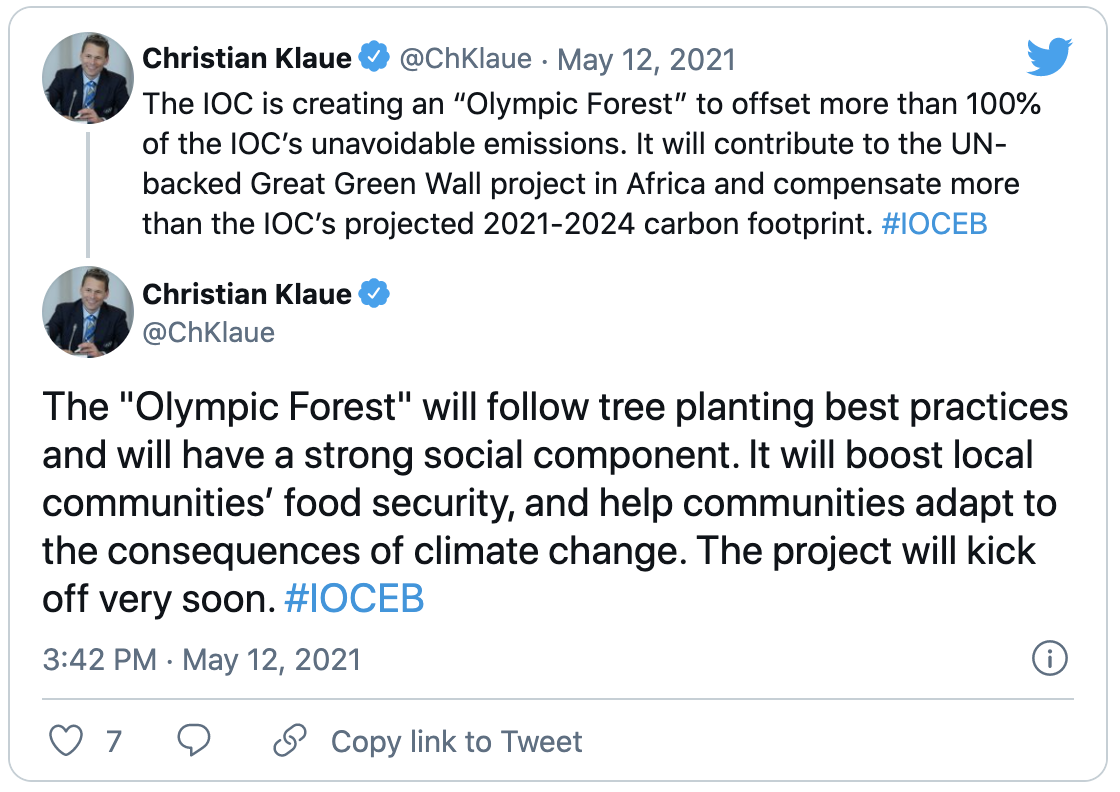
IOC to plant Olympic Forest in Africa to Offset Carbon Emissions
May 21, 2021
The International Olympic Committee (IOC) has committed to planting an ‘Olympic Forest’ in Africa to offset more than 100 per cent of the carbon emissions created by the Olympic Games. The committment follows the IOC's announcement earlier this year that it is working to become climate positive by 2024. Its ultimate goal is to reduce carbon emissions by 45 per cent by 2030 - also the target date for the world to achieve the UN Sustainable Development Goals (SDGs).
The Olympic Forest project will be mounted in collaboration with the United Nations Environment Programme (UNEP) as part of the Great Green Wall project – Africa's flagship initiative to combat the effects of desertification. The project aims to restore degraded landscapes across the Sahel region in Africa, between the Saharan desert and the Sudanian savanna.
According to the World Health Organization (WHO), land degradation has accelerated during the 20th and 21st centuries due to increasing pressures of agricultural and livestock production, urbanization, deforestation and extreme weather events such as droughts and coastal surges, which salinate land. Studies from the Global Forest Watch and World Resources Institute show that altogether 12.2m hectares of tree cover were lost in the tropics in 2020, an increase of 12% on 2019.
In addition to offsetting carbon emissions, the Olympic Forest will offer long-term social and biodiversity benefits. Inside the Games reported that experts are expecting the region’s population to grow sharply in the coming years, with the Great Green Wall improving biodiversity and food security. The IOC’s participation will also create an opportunity for other organisations and athletes within the Olympic Movement to contribute.

“Climate change is a challenge of unprecedented proportions, and it requires an unprecedented response,” said IOC President Thomas Bach. “Looking ahead, we want to do more than reducing and compensating our own impact. We want to ensure that, in sport, we are at the forefront of the global efforts to address climate change and leave a tangible, positive legacy for the planet. Creating an Olympic Forest will be one way in which we will work to achieve this goal.”
The IOC stated that both the upcoming Tokyo Olympics and the Beijing Olympics are on track to being carbon-neutral. Climate-positive Games are part of its Olympic Agenda 2020+5, a strategic plan that focuses on solidarity, digitalisation, sustainability, credibility and economic and financial resilience.
Recently, Tokyo 2020 announced that all energy required for operations at the Olympic and Paralympic Games will come from 100 per cent renewable sources. This electricity will be partly generated in the Prefecture Fukushima with support from Tokyo 2020 gold partner, petroleum company ENEOS.
ENEOS committed to supplying electricity to competition venues and facilities from only renewable sources. Energy will be generated from wood biomass power, which uses construction waste and tree clippings in Japan to produce electricity.